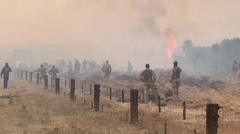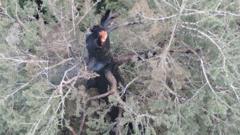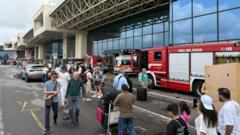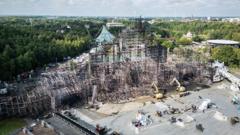The UK government has settled with thousands of Kenyans impacted by a major fire incident during a military exercise, a resolution that brings closure to a lengthy legal dispute over health and property damages.
UK to Compensate Kenyans Affected by Military-Induced Wildfire

UK to Compensate Kenyans Affected by Military-Induced Wildfire
Out-of-court settlement reached after significant fire incident during British military training in Kenya.
In March 2021, a devastating fire sparked during a training exercise by the British Army led to a large-scale environmental impact and significant losses for locals in the Lolldaiga conservancy in Kenya's Rift Valley. The UK government has now agreed to compensate approximately 7,723 claimants following negotiations that aimed to avoid the complexities of prolonged litigation.
Legal representatives estimated that the compensation could amount to £2.9 million, although the British government has not publicly confirmed the precise figure. This settlement follows four years marked by legal battles over claims of lost property and health complications attributed to smoke inhalation resulting from the fire.
Kevin Kubai, the lawyer representing the claimants, acknowledged the outcome as the "best possible" resolution, despite concerns that many claimants received limited compensation that did not fully reflect their losses. He cited potential difficulties associated with ongoing litigation, including the challenges presented by the loss of evidential documentation over time.
The fire reportedly originated from a camp stove that was accidentally knocked over during military operations, according to a 2022 investigation by the UK Ministry of Defence. Approximately 7,000 acres of land were burned in the incident, although it was noted that community land remained unaffected directly by the blaze. However, claims were made regarding environmental ramifications in neighboring areas, alongside property destruction due to wildlife chaos prompted by the fire.
The British government has started efforts to restore the impact area while maintaining military exercises in the region. The Lolldaiga conservancy, home to picturesque landscapes and rich biodiversity, has a controversial history tied to colonial times when a significant portion of land was seized by British settlers, resulting in persistent land disputes.
Though the British Army Training Unit Kenya (Batuk) significantly contributes to the local economy, controversies have emerged over misconduct by some soldiers that have also drawn public scrutiny. With the recent compensation agreement, the hope remains for a more harmonious relationship between local communities and military training operations moving forward.
Legal representatives estimated that the compensation could amount to £2.9 million, although the British government has not publicly confirmed the precise figure. This settlement follows four years marked by legal battles over claims of lost property and health complications attributed to smoke inhalation resulting from the fire.
Kevin Kubai, the lawyer representing the claimants, acknowledged the outcome as the "best possible" resolution, despite concerns that many claimants received limited compensation that did not fully reflect their losses. He cited potential difficulties associated with ongoing litigation, including the challenges presented by the loss of evidential documentation over time.
The fire reportedly originated from a camp stove that was accidentally knocked over during military operations, according to a 2022 investigation by the UK Ministry of Defence. Approximately 7,000 acres of land were burned in the incident, although it was noted that community land remained unaffected directly by the blaze. However, claims were made regarding environmental ramifications in neighboring areas, alongside property destruction due to wildlife chaos prompted by the fire.
The British government has started efforts to restore the impact area while maintaining military exercises in the region. The Lolldaiga conservancy, home to picturesque landscapes and rich biodiversity, has a controversial history tied to colonial times when a significant portion of land was seized by British settlers, resulting in persistent land disputes.
Though the British Army Training Unit Kenya (Batuk) significantly contributes to the local economy, controversies have emerged over misconduct by some soldiers that have also drawn public scrutiny. With the recent compensation agreement, the hope remains for a more harmonious relationship between local communities and military training operations moving forward.




















